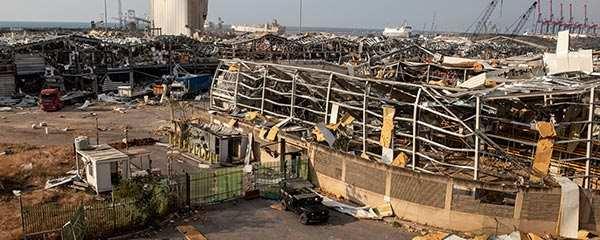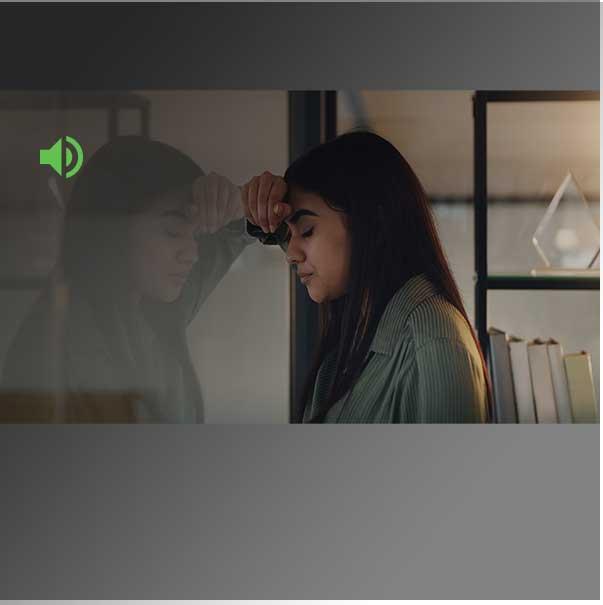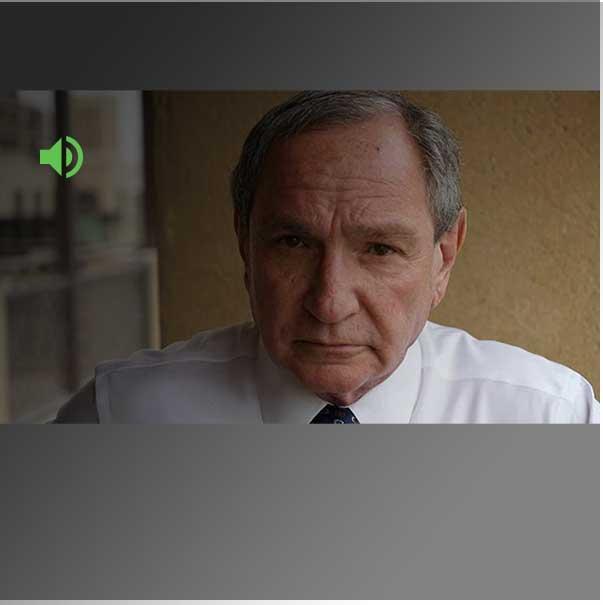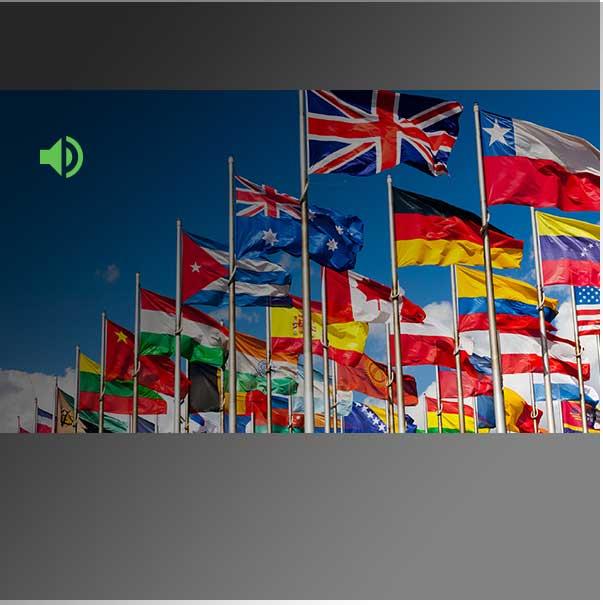As the two-year anniversary of one of the largest non-nuclear explosions in history approaches, how do Lebanese adults feel about their justice system and how this case is being dealt with? "The challenges that Lebanon is facing are more than any one country can handle," says Kim Ghattas, who joins the podcast to discuss the multiple crises that people in Lebanon are enduring.
Below is a full transcript of the conversation, including time stamps. Full audio is posted above.
Mohamed Younis 00:08
For Â鶹´«Ã½AV, I'm Mohamed Younis, and this is The Â鶹´«Ã½AV Podcast. This week, Lebanon passes a grim two-year anniversary of the disastrous port explosion that tore through the nation's historic capital, Beirut. But how do the Lebanese people themselves feel about how the case is being handled, their justice system and the varied crises their nation now faces? Kim Ghattas has covered Lebanon and the region as a journalist for the past two decades. She writes for The Atlantic magazine. Kim, it's a pleasure to have you on the podcast.
Kim Ghattas 00:37
Great to be here. Thank you.
Mohamed Younis 00:39
Lebanon has witnessed a, really a slew of political and economic disasters coinciding all at once. For those of us who don't follow the country closely, Kim, can you just take us through some of the basic challenges the country is facing today?
Kim Ghattas 00:55
The challenges that Lebanon is facing are more than any one country can handle, really. And in many ways I often think that Lebanon is the Petrie dish of the world. It's avant-garde when it comes to announcing what might go wrong in the world in a, in a bad way. Over the last two, three years since October 2019, when we had protests erupt against the corrupt establishment, the sectarian political system, the former warlords turned peacemakers who have been ruling the country for 30 years -- and of course, among them, still armed to the teeth, Hezbollah, a pro-Iran Shia militia in Lebanon. Since those protests, which were full of hope, everything has collapsed, because the protests came at a moment where the downward slope had started. And so the protesters get accused of having provoked the crisis, but they were actually just warning that we were about to, you know, fall really, really far down.
Kim Ghattas 02:04
We've had an economic crash with a devaluation of the Lebanese pound. We've had rapidly rising inflation -- astronomical numbers, in some cases. We've had the pandemic compounding the economic crisis, of course; that's a global event. And then we had the explosion at the Beirut port in August 2020. All of that for a small country of 10,000 square kilometers, you know, 4, 5, 6 million people -- the number is not always agreed upon. And that's a lot to handle in a country that has already been through a civil war, albeit 30 years ago -- but it takes a while to get over a civil war. And people felt that they had rebuilt, that they were moving on, that things were looking fine, that they had rebuilt their lives, their businesses, their savings, educated their children. And suddenly it was all yanked from under their, you know, the rug was pulled from under their feet. It was all yanked away. And that whiplash is very painful for people, and you've had a rush for the exits. People leaving, desperate to either send their kids abroad or start all over because their savings are stuck in the bank, and they find themselves unable to continue to function or plan for retirement or pay for their kids' tuition.
Kim Ghattas 03:28
It's that whiplash that I think is most painful, and the idea that there is no hope on the horizon. You know, as bad as a war is, you always hope that it'll end, and then you can rebuild. But here, there's really nothing in front of us on the horizon. And the way I describe it for people who may not know Lebanon, may not know what a vibrant, creative, cosmopolitan country it is, and a city, Beirut, in itself, but the country as a whole is very open. It has, you know, Lebanon has a large diaspora around the world. It's a country of emigration; people come and go, they come back. And so these waves of emigration have turned this country into a very open country to the outside world.
Kim Ghattas 04:14
And for the past 30 years -- and, and certainly before the civil war as well -- the lifestyle was one of really sort of the Northern Mediterranean; so not Tunisia, Egypt, Algeria, but more Italy, Greece, Spain. And that's where we were -- not with the kind of economy or GDP, but in terms of lifestyle and ease of living. And suddenly, within just two years, you're living in a country that is more akin to Venezuela. That's really a very rapid descent into the abyss that comes on top of decades of prior trauma. And that makes it all very difficult.
Mohamed Younis 04:56
I love how you really laid out that very vivid description in the end. It's really hard to understate how unique Lebanon is and Beirut is, but it's definitely the country at large on those fronts -- cultural, political. It's one of the countries where freedom of expression is really, it's incomparable to anywhere else in the Arabic-speaking Middle East, obviously with huge challenges on the, even on that front. But when you think about it, it really is an example of what a much more open and nondominated by one party political system or economy had an opportunity at one point, I guess, in the region. And even and then, in those kind of more brighter days that you mentioned, corruption has always been a major challenge. It's only gotten worse.
Mohamed Younis 05:54
So much of our data, Kim, in the past decade, but particularly really those two years that you highlight, really shows the impact these crises have had on Lebanese life evaluation, on their perceptions of government and corruption and business, but also on their perceptions of the judicial system. The port explosion, of course, was another tragic example of Beirut and Lebanon really coming into the world's focus. We're coming up now on two years since that explosion. Our data, when we asked Lebanese citizens about whether they wanted to see the investigation into the explosion continue, were overwhelmingly supportive. It was 60+% of people that expressed any opinion wanted it to see, wanted to see it move forward. One challenge that really stuck out to me was the sectarian differences in perceptions of whether they wanted to see it move forward or trust. And Lebanese who happened to be Shia were more likely to not want to see move forward. Let's back up. And I just want to ask you, where does that investigation stand? And how hopeful are you that we're gonna find out who did this or who's responsible?
Kim Ghattas 07:09
You know, as a journalist, my answer is going to sound terrible, because I'll be very honest: I have no idea. But that tells you something. It tells you that it's just not something that we're thinking about anymore, because everyone's given up. You know, I'm a journalist, but I'm also a Lebanese citizen. And you know, it's stalled somewhere in the back alleys of the corrupt system, the entrenched establishment that doesn't want anyone to find out what's going on. There are efforts outside of Lebanon to bring cases against the owners of the ship, the company that owned it. There are efforts, I think, all the way in the U.S. to claim compensation for dual citizens. But within the country, I don't know anyone around me who is still talking about this investigation. And that is really problematic, because the issue of accountability is essential to building a nation. If you don't have accountability, you cannot move forward in a sound way.
Kim Ghattas 08:17
And we know that in Lebanon because we rebuilt the country after the civil war without any accountability. So we built on unstable foundations, and we're paying the price. But again, as I said at the beginning, we are often a bellwether, a warning sign for other countries. Lack of accountability and continued impunity, whether it's in Syria, with President Bashar al-Assad; whether it's in Ukraine, with what Russia is doing. And of course Putin was also very busy bombing Russia; whether it's in the U.S., with the Jan. 6th insurrection and the trial, efforts at a trial and impeachment. Wherever it is, if you cannot have accountability, you know, impunity just seeps into the foundation of your nation, and you just never know when it's going to rumble under your feet.
Kim Ghattas 09:14
I think, for the Lebanese, they've given up on having justice or, well, certainly the victims or the, and the relatives of the victims and those who died in the blast haven't given up. You know, they, they're still pushing and clamoring for their rights and trying to push for a law in parliament to claim compensation, keep people accountable. There are still efforts. But as a national conversation, that does not, that does not exist. That's also a problem. Either we're in it all together, or we're not gonna make progress. But people are so consumed by their day to day, by getting a pack of bread, of pita bread, which has just completely disappeared from the market right now -- partly because of Ukraine, partly because of the subsidies have been lifted, etcetera.
Kim Ghattas 10:05
But the sectarian issue that you, that you, that you allude to -- and we can go into it into more detail -- I just want to say that Lebanon's diversity is its strength in so many ways. It is what sets it apart from the rest of the region. We don't have one dominant party or one dominant political party or one dominant sect. That's what makes the diversity such a, such a change, such a, such a appeal in the country for others as well from the region, who come here to find this freedom of expression -- narrowing, but it's still there, and certainly, relatively, to the rest of the region. But as you said, it provokes fissures as well in the political system. It's a way of stalling; it's a way of delaying reforms; and it's a way of holding on to power for those who benefit from this division of roles along sectarian lines. And they use that as well to stall the investigation.
Mohamed Younis 11:08
Lebanon is a tiny country. But regional tensions between Iran and Saudi have had a devastating impact on the nation's ability to assert its sovereignty and really function as a nation-state on many fronts. You talk a lot about this rivalry in your book Black Wave, which is awesome, and I recommend everyone listening to check it out.
Kim Ghattas 11:28
Thank you.
Mohamed Younis 11:29
So this is my question, Kim: Do you see a future in which Lebanon can reclaim its independence and have a state decision-making process that holds Lebanese interests first?
Kim Ghattas 11:41
That would be a first, because I don't think we've ever been there. We're a small nation, and small nations are always a playground for neighboring bigger states or international states. You know, we don't have any oil, at least not that we know of; there's some drilling that might happen or might not happen at some point off the coast of Southern Lebanon, for gas, rather than -- . But we've always been a playground. I mean going back to the '50s and the '60s, when -- and in the '60s and '70s, when, you know, the Palestinian refugees came to Lebanon, and it became a base for the Palestinian Liberation Organization. And there was a talk of war between the left and the right, you know, right nationalist Christians and pro-left, pro-Palestinian Muslims, and that meant that you had the Saudis and the Israelis and the Syrians. And everyone was, you know, had their had their finger in the pot.
Kim Ghattas 12:44
And then, of course, you had the civil war, which was the explosion of that tension between the right and the left, which then devolved into a playground for Iran after 1979, as it came under, as it became the Islamic Republic and saw an opportunity in Lebanon to push back against American influence in the region. And you had hijackings and bombings and etc. So we've always been a playground. We've had moments where we've had statesmen that were able to push back and assert themselves a little bit more. And this Saudi-Iran rivalry has been, I'm not sure I would use the word "devastating"; I think it has played out in such a way in this country that it has, because of the way that each player plays the game, has allowed Iran to take over.
Kim Ghattas 13:47
And from my perspective, Iran's behavior is quite destructive -- in Iraq, in Syria, in Yemen, in Lebanon. That's not to say that the Saudis are necessarily constructive; I mean just look at the role they played in Yemen. But in Lebanon, most of the damage, in my view, is done by Iran. And you could argue that Saudi Arabia allowed that to happen because they just play the chessboard terribly, and they, you know, they play a bad hand even worse.
Kim Ghattas 14:22
How do we move on from here? It's very important for us as Lebanese to acknowledge that not all our problems are a regional issue. You know, our corruption, our mismanagement, our overspending, our lack of commitment, ability to pursue accountability -- that's local; those are domestic problems, and we have to address them. And that's the beginning. If you can't sort of solve the Rubik's Cube of the Saudi-Iran rivalry, start local. But there is a tendency to say, well let's just wait to see what, you know, what happens in the region. And that's because some of the players are very much tied to the region, you know, like Hezbollah. Hezbollah is waiting to see whether Iran is going to get the upper hand in the negotiations or not. In the meantime, the Saudis seem to be making quite a bit of progress in their thaw with the Americans, in their efforts to reach out to the region -- the Turks, the Qataris. Now they're touring Europe -- Mohammed bin Salman is touring Europe.
Kim Ghattas 15:25
So the balance seems to be shifting again in favor of the Saudis. And I think, if anything, Lebanon should first hope for a balance in the influence between the Saudis and the Iranians in Lebanon back to the status quo. It's not ideal, but as a first step, we should aim to find this balance again, where neither one is top dog. Because when Iran became top dog, that's when things got really, went really wrong, I think.
Mohamed Younis 15:58
I want to end on a hopeful note. I think one of the things, one of the good stereotypes about Lebanon and its people are that they're some of the most industrious entrepreneurial and successful diasporas around the world, when it compares to other Arabic-speaking countries. What gives you hope for Lebanon's future?
Kim Ghattas 16:23
The ability of the Lebanese to always reinvent themselves and rebuild. But I do wonder whether we've reached really the end of people's ability to do that. People are exhausted. They really are exhausted. I mean, I am exhausted, and I have the choice to get on a plane and leave. But I stay for various reasons, including because I think it's important to stay. But there are days where I think, "Why am I here? Why am I here?" I have 12 hours of power a day. I can't find bread for my mother. I have to drive around the city for hours, finding the right medication for her. I have to walk up six flights of stairs at least two, three times a day, because there's no power, and I live on the sixth floor, and there's no elevator. I'm breathing polluted air all day long because the generators -- the backup generators that run to give you those 12 hours of power a day, because there is no city power; this is all backup power by a local system also run by a mafia. You know, all that pollution into the air.
Kim Ghattas 17:28
And so I have to say, it's not easy to stay. And I am hugely in awe of those who stay by choice; those who stay because they can't leave as well and are soldiering on and keeping things running -- whether it's the post office, whether it's the customs control, whether it's the traffic policeman, the gas station owner, the bakery owner who's being insulted because he's not selling bread, but it's not his fault because there's just no flour being delivered to him. They're just soldiering on; everybody is powering through. And I guess that's where I get the hope that we will just sort of manage to get through. And there is a new generation that is staying and pushing for a different future. We, you know, many of them ran for the parliamentary elections in May and had some, you know, decent breakthroughs. I mean, they won 10% of the seats, which is really not much, but it's actually a lot, considering that before it was 0%.
Kim Ghattas 18:30
So there are bits of, pockets of resistance, of hope, of civil liberties, of pushback, of creativity. And the creativity really is still unbelievable. People coming up with new projects, with new restaurants, with new art fairs, with new paintings, with new movies. It's unbelievable. And I think that's what keeps us going. And that's what gives me hope that, at the end of it, we'll, we'll come out -- I'm not gonna say we'll come out stronger, because we're exhausted -- but we'll come out of there having learned something. And I hope it's a lesson we can impart to the world. Because not only is it about accountability, it's about capitalism gone wild. And I think we're seeing that somewhat unravel around the world. It's about supply chains and just sort of, you know, being able to push a button and get everything you want. There's something that's gone a bit awry after, 30 years after the end of the Cold War and the global order that was built, it doesn't work for everyone. And it, to me, it collapsed first in Beirut port.
Mohamed Younis 19:37
I'll never forget, one of my favorite pictures I've seen about Lebanon was just, it was an air shot of Beirut. And it says, "Beirut, a city that will never surrender." And I think that absolutely applies to Lebanon. If you've been there, it's impossible not to fall in love with the country and the people. On that very inspiring note, that's the legendary Kim Ghattas, journalist and author of Black Wave. Kim, it was a pleasure to have you on the show.
Kim Ghattas 20:03
Thank you very much for having me.
Mohamed Younis 20:11
That's our show. Thank you for tuning in. To subscribe and stay up to date with our latest conversations, just search for "The Â鶹´«Ã½AV Podcast" wherever you podcast. And for more key findings from Â鶹´«Ã½AV News, go to news.gallup.com or follow us on Twitter @Â鶹´«Ã½AVnews. If you have suggestions for the show, email podcast@gallup.com. The Â鶹´«Ã½AV Podcast is directed by Curtis Grubb and produced by Justin McCarthy. I'm Mohamed Younis, and this is Â鶹´«Ã½AV: reporting on the will of the people since the 1930s.



